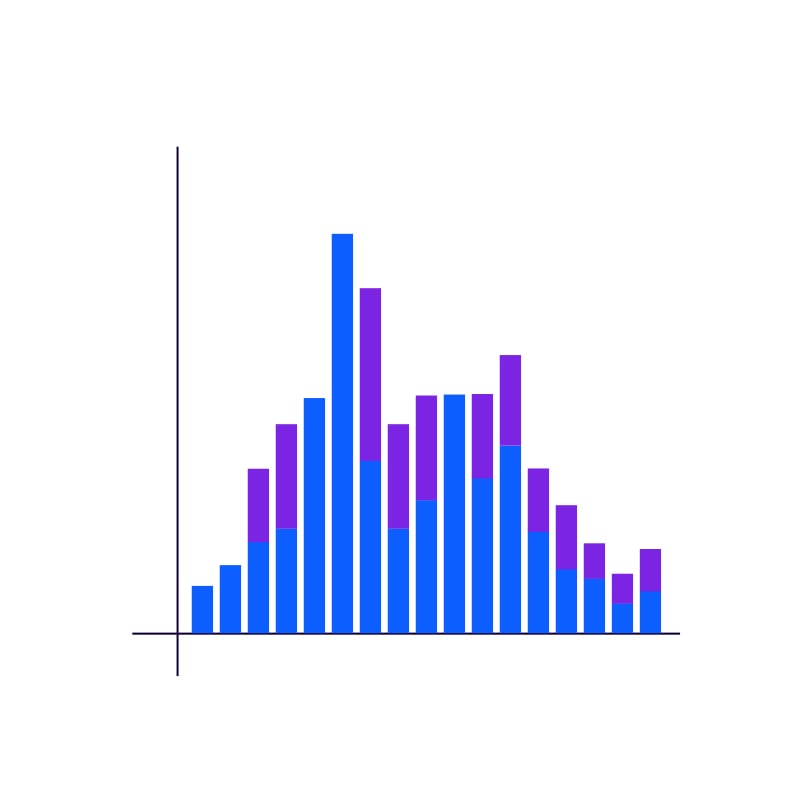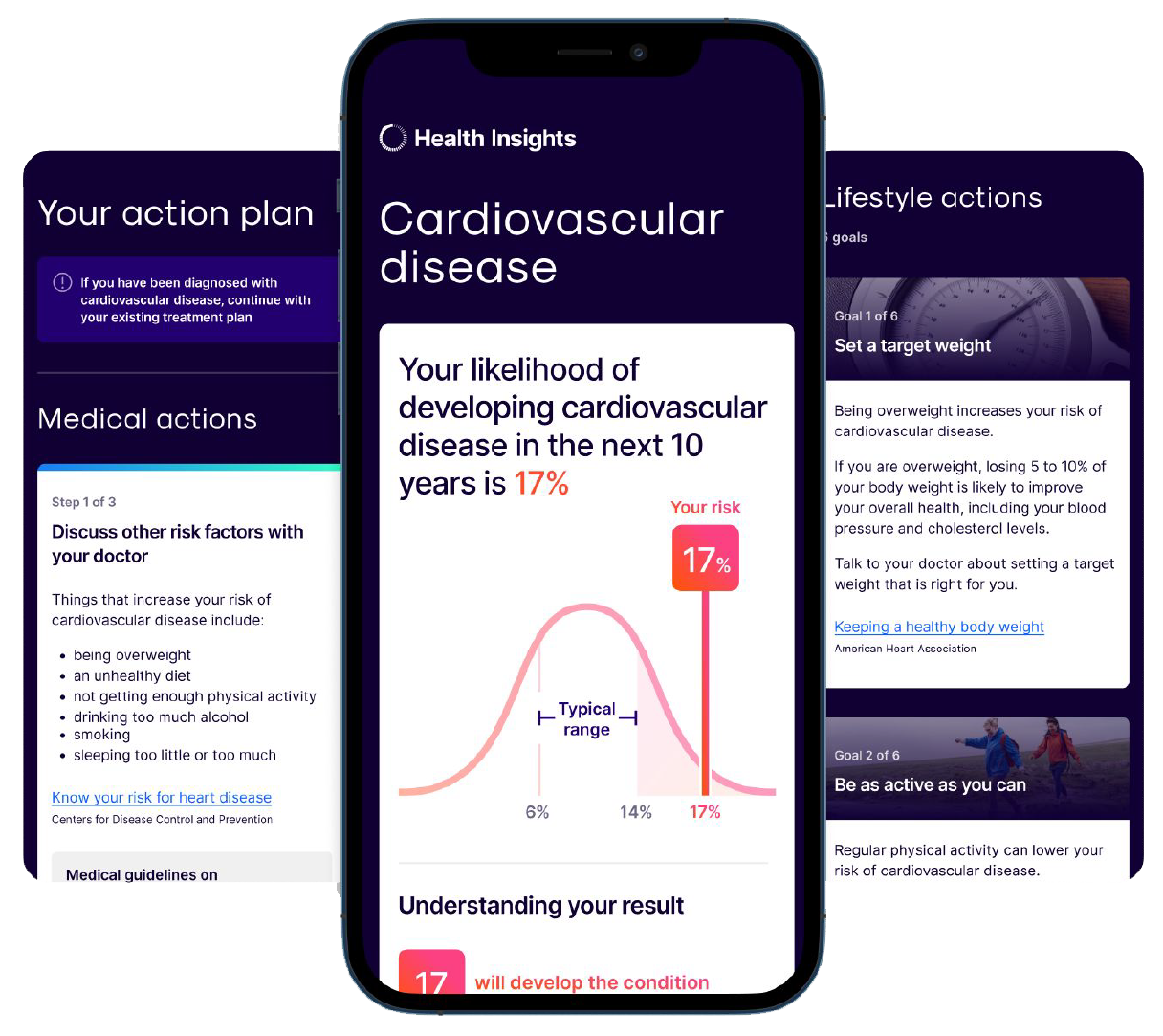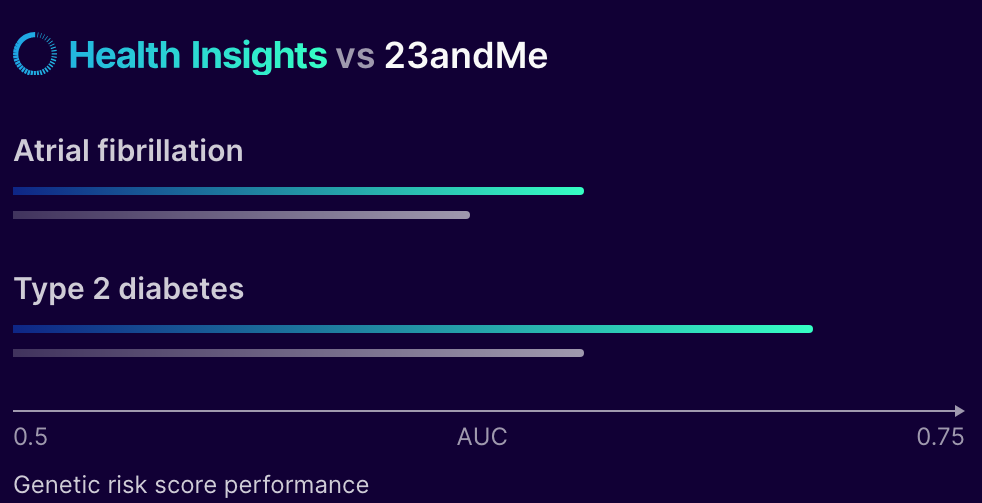The information you need for a healthier future
We calculate your risk for many common and chronic health conditions – including cancers, cardiovascular disease, autoimmune disorders and diabetes – by combining your genetic information with other important risk factors specific to you. We then guide you on your journey to a healthier, longer life.


+ NO COST TO YOU
Offered by your insurer, employer, or healthcare provider at no cost to you
+ CLEAR + SIMPLE
A simple saliva test you can do at home
+ SECURE + CONFIDENTIAL
Report is returned directly to you
+ PERSONALISED + ACTIONABLE
Tailored action plan based on your risk profile


Take action with tailored health advice
Genomics helps you understand your risk and plan for the future. Based on your risk profile, we present you with actionable information about what to discuss with your doctor, and give you helpful advice on setting diet, exercise and other lifestyle goals.
Industry-leading accuracy
Our test looks at millions of DNA variants to predict your risk of each condition. Our trusted research is published in top medical journals.

Chart data
The data in these charts is based on people of European ancestry.
Genomics plc (2023) for Health Insights.
Multhaup et al (2019) and Ashenhurst et al (2020) for 23andMe.
Homburger et al (2019) for Color Health.


Our promise to you
- We will never share your personal data with your insurer or employer
- We will never sell your data to a third party
- You can ask us to stop using your data at any time
Frequently asked questions
+ How do I get a test?
Our test is offered through insurers, employers, hospitals, medical practices, or other healthcare providers who have signed up with Genomics. Once invited, you can request a test online. An easy-to-use saliva test kit will be sent to your home. Simply return to us in the pre-paid packaging provided.
+ How is this information used?
Clinics use our tests to help your doctor develop a health strategy tailored to you by understanding your risk for a specific health condition. Health systems use our tests as a population health management tool to identify your risk for many different health conditions at once. They can then use these findings to determine whether you and other people with your risk profile might benefit from early interventions, such as cancer screenings or medical treatments. Insurance companies and employers benefit by keeping their members and employees healthier for longer, thereby avoiding high-cost claims.
+ How is this genetic test different from others?
Most genetic tests look at a small number of positions in the genetic sequence where we know that a mutation causes the person to have a particularly high risk of disease — or to even give a guaranteed outcome of disease. These types of mistakes are very rare. By contrast, our test looks at more common variations in the genetic sequence.
While each variant only has a small effect on the risk of a health condition, by combining information from tens of thousands of these common variants in a Polygenic Risk Score (PRS) — along with information about non-genetic risk factors — we can see substantial differences in risk between individuals. This is the single best way of determining one’s risk of disease.
+ How does the test determine my specific risk for a health condition?
Our tools are based on a scientific measurement of your genetic information called a Polygenic Risk Score (PRS), which we integrate with other non-genetic information. A PRS provides a summary of your genetic predisposition to a particular health condition.
Think of DNA as a string containing billions of letters. While over 99% of the string is shared by all human beings, there are also millions of points where two alternative letters are each commonly seen in the population. In thousands of these genetic locations, one letter is associated with a different level of risk for a health condition than the other letter. Our test reads and combines risk data from these locations, creating a unique PRS for each health condition.
A distinct PRS, integrated with factors like your biological sex or race contribute to your individualized risk assessment for each condition.
+ How does knowing my genetic risk for a disease benefit me?
Understanding your likelihood of developing a particular health condition helps your doctor tailor their medical recommendations to you. They might recommend earlier or more frequent screening, further tests, medical treatments, or changes to your lifestyle. This can help you make more informed decisions about your specific health and healthcare needs, allowing you to act early and take preventive measures.
+ How long will it take to get my test results?
You will be sent a report with results and recommendations within 4-6 weeks of returning the saliva test.
+ What do you do with my genetic data?
We do not sell the genetic data we have to other companies or to anyone. We do not share your personal data with insurance companies.
Although we do our analysis in-house, we outsource our laboratory activities to trusted third-party providers. Only people authorized to use your DNA for the purpose for which you have given consent are able to handle it.
Securing your data is of paramount importance to us. We have designed all of our processes to ensure your data is only ever used securely and lawfully. We will always obtain your consent to use your information, and we will always make it clear about why we are using it.
Click here for detailed privacy information about our test.
+ For further information, visit our Help Center
Click here to visit our Help Center.